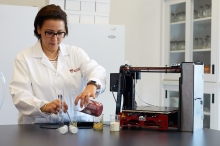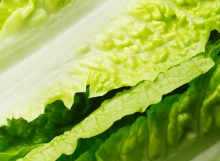Mais comment développe-t-on de nouveaux ingrédients fonctionnels? Avec énormément de rigueur scientifique et de patience, comme en font foi les travaux de recherche de Salwa Karboune, professeure adjointe et doyenne à la recherche au département des sciences des aliments et d’agriculture à l’Université McGill. « Nous savons aujourd’hui que le microbiote intestinal est, en quelque sorte, le cerveau de notre santé », affirme Mme Karboune. C’est pourquoi il est si important d’étudier les composés qui favorisent la santé intestinale.


In a recent episode of La Semaine Verte, Professor Salwa Karboune gaves viewers a birds-eye view of her work to define the antimicrobial activity of certain natural ingredients and better understand how they interact with each other. “The more we understand this, the more we will be able to modulate the ingredients in such a way that they function appropriately in our food products”.

NutriPulse has captured 3rd place in the 2018 World Vision Food Security Social Innovation challenge! Co-Founders and PhD candidates Josephine Ampofo (FdSci), Adeyemi Adegbenjo (BRE) and Zeyan Zhong (FdSci) will spend the next year building their project.
(Op-ed by Lawrence Goodridge, Associate Professor and Director of the Food Safety and Quality Program in the Food Science and Agricultural Chemistry Department at McGill University)

Dozens of McGill researchers will participate in two of the five “superclusters” announced Thursday, Feb. 15, by the federal government and funded under its Innovation Superclusters Initiative.

However, Lawrence Goodridge, the director of McGill University's food safety and quality program, said the practice of thoroughly washing infected lettuce won't make it safe for consumption.
"That is actually untrue, that is not the case," he said. "Washing lettuce or any fresh produce that may be contaminated with bacteria is a not a way to ensure its safety."
"The number of bacteria that one must consume to become sick is so low — and when you wash a lettuce or any fresh produce, you cannot wash away 100 per cent of the bacteria."
Unlike alcohol, which kills bacteria and toxins, Lawrence Goodridge argues, integrating cannabis in the place of alcohol may require a very different production process. “Because cannabis is a plant, there are certain concerns -- like the possibility of pesticides used in production, or the type of fertilizer used, or the potential presence of heavy metals that could be toxic to humans,” the McGill University food safety expert explained to BNN in a telephone interview.
The Honourable Kirsty Duncan, Minister of Science, announced a total investment of $52 million from the Canada Foundation for Innovation (CFI) John R. Evans Leaders Fund for 220 new infrastructure projects nationally. Among the 51 universities across the country with funded projects, McGill leads the pack with an impressive number — 23 projects totaling $4.2 million — in this latest round of the funding competition.
Congratulations to Faculty members Valérie Gravel (Plant Science) and Salwa Karboune (Food Science) who were among the recipients.
The list of “bad things” could range from gross but harmless spoilage to dangerous pathogens such as Clostridium botulinum. In the case of botulism, it’s the toxin produced from the bacteria that is harmful, not the bacteria itself, says Brigitte Cadieux, a postdoctoral fellow in McGill University’s Department of Food Science and Agricultural Chemistry.
Read more in the Globe and Mail

Congratulations to Hoshahalli S. Ramaswamy of the Department of Food Science and Agricultural Chemistry who will be inducted into the Royal Society of Canada on November 18, in Kingston, Ontario. The Royal Society of Canada announced the 2016 Fellows on September 7; Professor Ramaswamy is one of ten McGill researchers this year to receive this honour.

For the second consecutive year, Macdonald Food Science teams have won big, Two teams — Rephyll and Fitamin Multimeal — took first place in their categories at the annual New Product Development Competitions, held as part of the 2016 Institute of Food Technologists (IFT) Conference.
Eurofins Food Safety Systems (EFSS) and the Food Safety and Quality Program (FSQP) at McGill University are excited to announce a signed agreement to provide co-branded public training for the Canadian food manufacturing industry. The courses include the highly sought-after FSMA Preventive Controls Qualified Individual Training as well as GFSI benchmarked standard training to SQF and BRC. The partnership is an exceptional pairing as Eurofins and McGill University share a common interest in the success of the Canadian food manufacturing industry.
LAWRENCE GOODRIDGE, DEPT. OF FOOD SCIENCE AND AGRICULTURAL CHEMISTRY, WAS INTERVIEWED ON CBC RADIO’S HOMERUN AT 5:40 PM ABOUT AN OUTBREAK OF HEPATITIS A LINKED TO BERRIES SOLD AT COSTCO.
LISTEN: CBC Homerun

|KATHY MACLEAN, COMMUNICATIONS, FACULTY OF AGRICULTURAL AND ENVIRONMENTAL SCIENCES
There was good news all around for the Quebec agri-food sector in the recent provincial budget.
